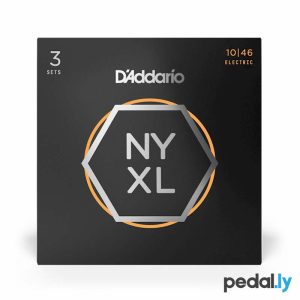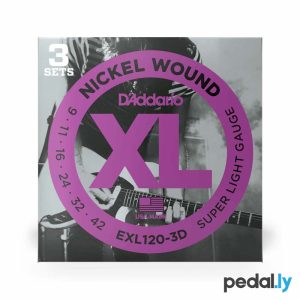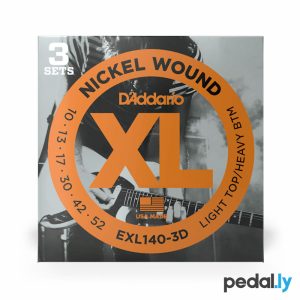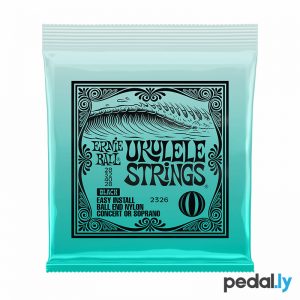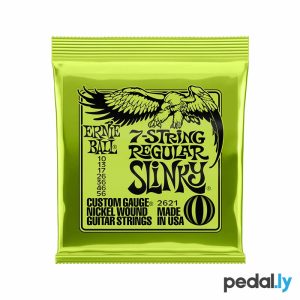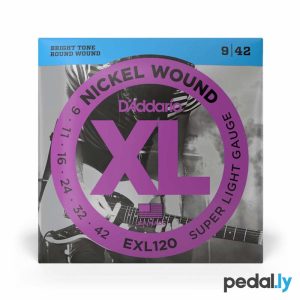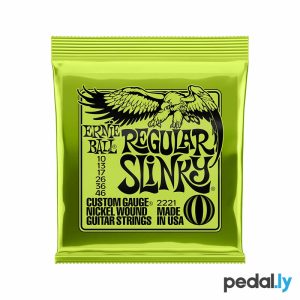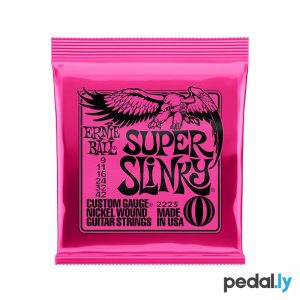Strings
Strings
-
D’Addario EXL110-10P 10-46 Regular Light, XL Nickel Wound Electric Guitar Strings 10-Pack
$57.99 Add to cart -
D’Addario NYXL1046-3P 10-46 Regular Light, NYXL Electric Guitar Strings 3-Pack
$33.99 Add to cart -
D’Addario EJ16-3D 12-53 Light, Phosphor Bronze Acoustic Guitar Strings 3-Pack
$22.99 Add to cart -
Ernie Ball Regular Slinky Nickel Wound Electric Bass Strings – 50-105 Gauge
$22.99 Add to cart -
Ernie Ball Super Slinky Nickel Wound Electric Bass Strings – 45-100 Gauge
$22.99 Add to cart -
D’Addario EXL120-3D 09-42 Super Light, XL Nickel Wound Electric Guitar Strings 3-Pack
$18.99 Add to cart -
D’Addario EXL110-3D 10-46 Regular Light, XL Nickel Wound Electric Guitar Strings 3-Pack
$18.99 Add to cart -
D’Addario EXL140-3D Nickel Wound Electric Guitar Strings, Light Top/Heavy Bottom, 10-52, 3 Sets
$18.99 Add to cart -
D’Addario EXL115-3D Nickel Wound Electric Guitar Strings, Medium/Blues-Jazz Rock, 11-49, 3 Sets
$18.99 Add to cart -
Stringjoy Signatures, 7 String Balanced Light Gauge (10-60) Nickel Wound Electric Guitar Strings
$14.99 Add to cart -
Stringjoy Naturals, Light Gauge (12-54) Phosphor Bronze Acoustic Guitar Strings
$14.99 Add to cart -
Stringjoy Signatures, Balanced Medium Gauge (11-50) Nickel Wound Electric Guitar Strings
$11.99 Add to cart -
Ernie Ball Regular Slinky Cobalt Electric Guitar Strings 10-46 Gauge
$9.99 Add to cart -
Ernie Ball Ukulele Ball End Nylon Strings Clear
$9.99 Add to cart -
Ernie Ball Ukulele Ball End Nylon Strings Black
$9.99 Add to cart -
Ernie Ball Regular Slinky Nickel Wound 7-String Electric Guitar Strings 10-56 Gauge
$8.99 Add to cart -
Ernie Ball Super Slinky Nickel Wound 7-String Electric Guitar Strings 9-52 Gauge
$8.99 Add to cart -
D’Addario EXL120 09-42 Super Light, XL Nickel Wound Electric Guitar Strings
$8.49 Add to cart -
D’Addario EXL140 Nickel Wound Electric Guitar Strings, Light Top/Heavy Bottom, 10-52
$8.49 Add to cart -
D’Addario EXL115 Nickel Wound Electric Guitar Strings, Medium/Blues-Jazz Rock, 11-49
$8.49 Add to cart -
Ernie Ball Skinny Top Heavy Bottom Slinky Nickel Wound Electric Guitar Strings 10-52 Gauge
$6.99 Add to cart -
Ernie Ball Power Slinky Nickel Wound Electric Guitar Strings 11-48 Gauge
$6.99 Add to cart -
Ernie Ball Regular Slinky Nickel Wound Electric Guitar Strings 10-46 Gauge
$6.99 Add to cart -
Ernie Ball Super Slinky Nickel Wound Electric Guitar Strings 9-42 Gauge
$6.99 Add to cart -
Ernie Ball Hybrid Slinky Nickel Wound Electric Guitar Strings 9-46 Gauge
$6.99 Add to cart
How do I choose guitar strings?
Choosing guitar strings depends on a few factors, including the type of guitar you have, your playing style, and your personal preferences. Here are some factors to consider:
-
Gauge: The gauge of the strings will affect the tone and playability of your electric guitar. Lighter gauge strings (0.009-0.042) are easier to play, but they may not produce as full of a sound as heavier gauge strings (0.010-0.046 or higher). Heavier gauge strings can also be more challenging to bend, but they may provide more sustain and a fuller sound. As a beginner, you may want to start with lighter gauge strings until you develop your playing technique.
-
Material: Electric guitar strings are typically made of nickel-plated steel or stainless steel. Nickel-plated strings have a warmer, smoother tone, while stainless steel strings have a brighter, more cutting tone. Coated strings are also available, which have a longer lifespan and a slightly different sound than uncoated strings.
-
Playing style: The type of music you play and your playing style can also influence your string choice. For example, if you play rock or metal music and use a lot of distortion, you may want to use heavier gauge strings to avoid them becoming too loose or flappy. If you play blues or jazz, you may prefer lighter gauge strings for better playability and to create a smoother sound.
-
Personal preference: As with acoustic guitar strings, personal preference plays a large role in choosing electric guitar strings. Different brands and types of strings will produce different sounds and feel different under your fingers, so you may need to try a few before finding the perfect match for you.
When choosing electric guitar strings, it’s important to balance the tone, playability, and durability of the strings to find what works best for you and your playing style. Don’t be afraid to experiment with different types of strings until you find the ones that sound and feel best for your playing.


